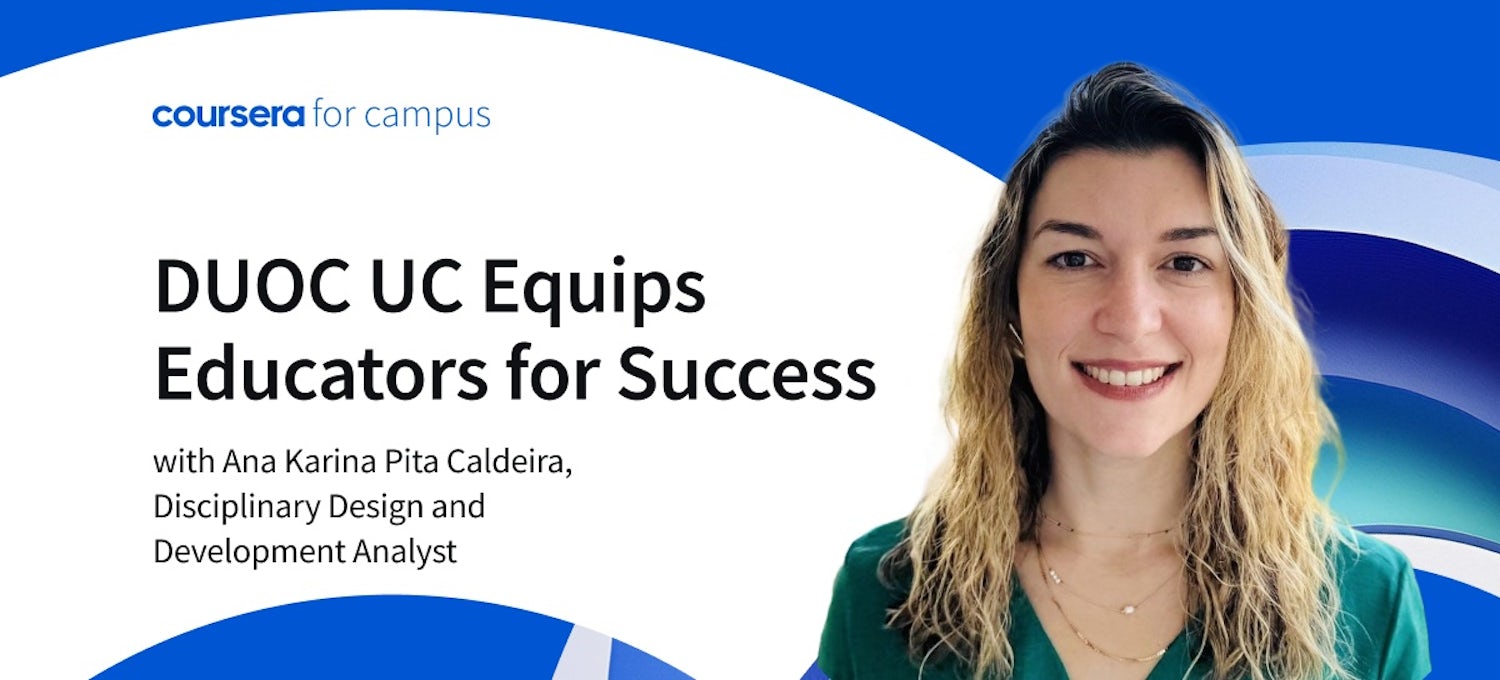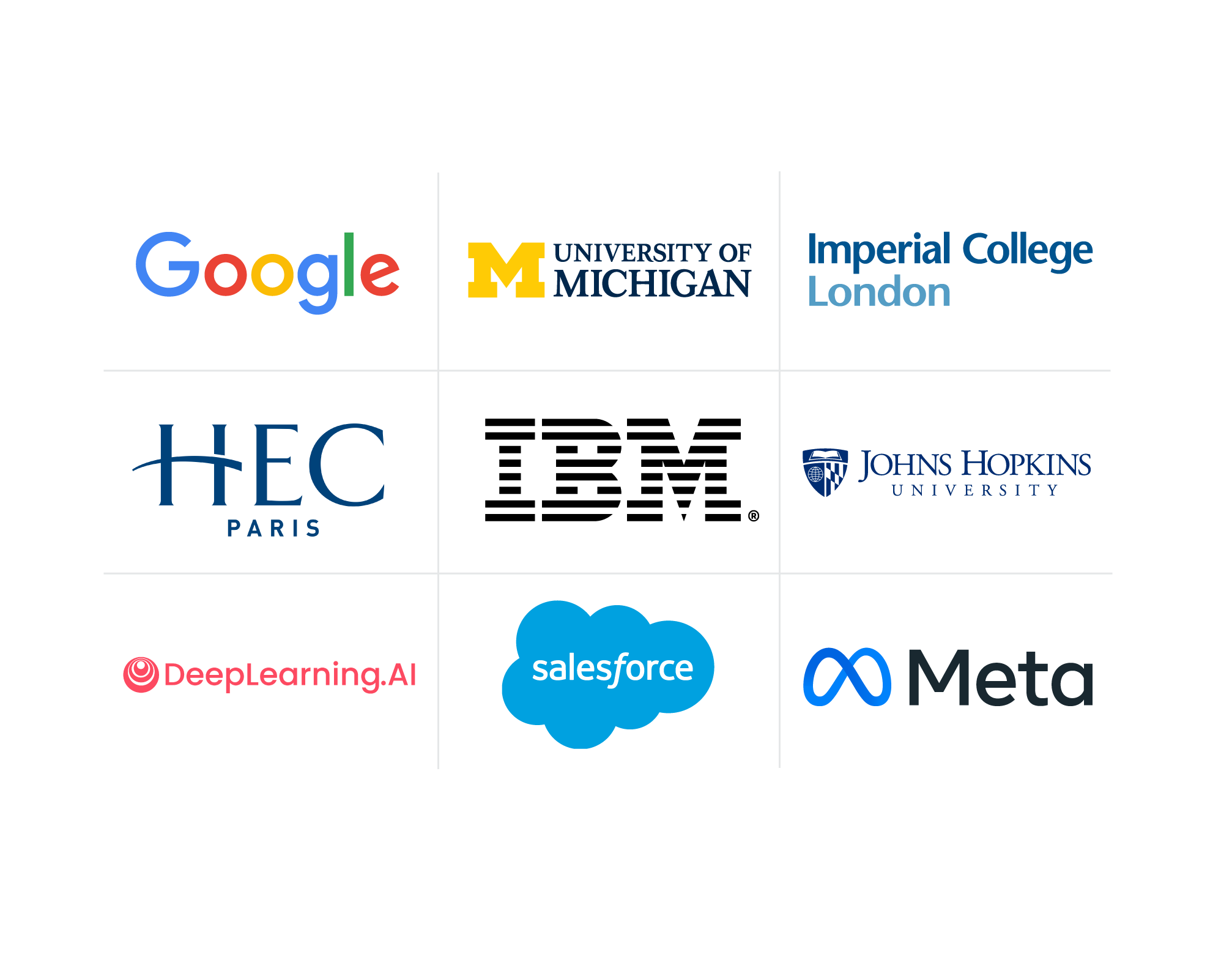Equipping Educators: DUOC UC Drives Excellence in Faculty Upskilling
Ana Karina Pita Caldeira, Disciplinary Design and Development Analyst at DUOC UC, shares insights into how the institution enhances teaching development by aligning training programs with global trends and in-demand skills.

In today's evolving educational landscape, DUOC UC, a Chilean higher education institution, is working to redefine technical and professional training to meet the diverse needs of its faculty and students.
In this interview, Ana Karina Pita Caldeira, Disciplinary Design and Development Analyst at DUOC UC, shares insights into how the institution aligns training with global trends, fosters self-managed learning, and develops personalized upskilling options with Coursera to equip educators to deliver the highest quality learning experience for their students.

Tell us a little bit about your organization and the teams or communities you support.
DUOC UC is a Chilean higher education institution with seven years of Comisión Nacional de Acreditación (CNA) accreditation. It has more than 100,000 students and a wide range of technical and professional programs distributed across 18 locations and three campuses in five geographic areas of the country. Through the Centro de Formación Docente (CFD), we support more than 4,000 teachers in the institution in implementing the Institutional Training Plan, favoring the disciplinary, pedagogical-methodological, digital skills, and other areas.
In particular, I work on designing, implementing, and monitoring disciplinary training strategies, providing direct support to our schools and programs to strengthen teachers' competencies and capabilities in their respective areas of expertise. Our community is diverse and inclusive, with experience in technical and vocational training and a competency-based training model. We seek relevant, flexible, and high-quality training options that meet their real needs. Coursera has been a key tool in this regard.
What unique challenges does your institute face that an online learning platform like Coursera helps address?
DUOC UC faces the challenge of engaging graduates and helping their profiles meet market needs, which means constantly updating a diverse and large teaching community. In addition to this is the need to offer flexible training that adapts to teachers' demanding schedules without compromising the quality of learning.
In this context, Coursera allows us to address these gaps, offer access to updated courses aligned with global trends, and reach a large number of teachers. The asynchronous approach facilitates participation from anywhere and at one's own pace, promoting self-managed learning. It also helps to motivate ongoing professional development.
Read more: Explore the 2025 Global Skills Report
What key qualities do you believe are essential for an online learning program to effectively empower learners, whether they’re students, employees, or citizens?
An effective online learning program has four key qualities:
Quality
Flexibility
Support
Mentoring
How do you ensure that your programs equip learners with the in-demand skills they need to thrive in their careers or roles?
In the case of training with Coursera, we built personalized catalogs by academic unit (Schools and Transversal Skills Programs), selecting courses that address both the disciplinary competencies associated with our students' graduate profiles and those highly in-demand in the labor market. This selection is based on institutional analysis and the recommendations offered by Coursera.
Additionally, the Spanish-language offer has increased thanks to AI translation, self-managed reporting, and mentoring support through tutors who monitor participants' progress. A satisfaction survey is also implemented, allowing us to continuously adjust and improve the training offerings, as well as make informed decisions about future courses.
Access to a comprehensive and up-to-date catalog has been key to advancing our institutional goal of strengthening the disciplinary competencies of our technical and professional faculty.
How do you motivate and empower learners to actively engage in online learning programs?
From the outset, we strive to ensure that teachers understand the purpose of the training and how it is directly linked to their professional development. Therefore, each application period highlights specific benefits such as course completion certifications, advanced training, and the opportunity to strengthen their professional profile with high-quality courses.
Furthermore, we promote autonomy through a voluntary pre-registration process, allowing each teacher to choose courses based on their interests and needs. Throughout the courses, tutors support teachers and provide guidance and personalized follow-up, which has been key to maintaining engagement and achieving high completion rates. This combination of clarity, flexibility, and support has led to a motivating and sustained learning experience.
What’s surprised you most about how learners engage with online learning programs and content?
I’ve been impressed by the level of autonomy and perseverance that many teachers have demonstrated while participating in the training. Despite having demanding schedules and multiple responsibilities, many of them manage to organize their time and make steady progress. This is also reflected in their willingness to explore emerging subject areas, such as artificial intelligence, data analysis, or advanced digital skills, recognizing the value of upskilling.
What impact have you seen in learner outcomes, such as job readiness, performance, or confidence, since adopting Coursera?
Although we have not yet formally measured the impact on teacher performance, we have observed a greater openness to online training and a growing trust in digital platforms as learning spaces.
How has access to a broad catalog of skills-focused content from top universities and industry leaders helped your institute achieve its goals?
Access to a comprehensive and up-to-date catalog has been key to advancing our institutional goal of strengthening the disciplinary competencies of our technical and professional faculty. Coursera allows us to offer specialized training in topics that, due to their complexity or relevance, are not always available locally or within internal offerings. Having content created by prestigious universities and industry leaders provides academic and practical support that is highly valued by our teaching community.
How do you see the future of learning and work evolving with new technologies like generative AI, and how is your institute adapting?
We believe that the future of learning and work will be strongly influenced by the integration of technologies and artificial intelligence. These tools allow us to personalize the learning experience, automate tasks, and develop key skills for employability. At DUOC UC, we have promoted concrete actions such as a Digital Competencies Framework for Teachers, a training program in AI applied to education, and the incorporation of emerging technologies such as the metaverse, holograms, and C1DO1*. This transformation is part of our strategic development plan to advance toward a more relevant, innovative, and connected technical and professional education.
*Editor’s Note: C1DO1 is an experiential learning methodology that facilitates teaching practical and technical skills remotely and asynchronously [1].
What advice would you give other leaders, whether in education, business, or government, looking to integrate or scale online learning?
More than a technological decision, scaling online learning is a process that must put people at the center. We recommend starting with a clear strategy that connects with the organization's objectives, but also with the real needs of those learning. Supporting participants, actively listening, and being willing to adjust the path are key. Collaboration between teams and a culture of continuous improvement make the difference when seeking profound and sustainable change.
Explore Coursera for your campus
Coursera for Campus empowers any university to offer job-relevant online education to students, faculty, and staff and includes credit-recommended content and academic integrity tools that support institutions in assessing their ability to recognize content for academic credit.
With Coursera for Campus, you can promote student employability by teaching in-demand skills for high-growth fields and help students master and prove job-ready skills with Guided Projects and Professional Certificates. Students can connect to a wide range of content from hundreds of industry leaders and universities, all while streamlining the learning experience by linking Coursera to your learning management system. Equip your students with today’s most in-demand skills and prepare them for job success with Coursera for Campus.
Article sources
1. Solve. "C1DO1 by Training Competence, https://solve.mit.edu/solutions/52463." Accessed September 11, 2025.
This content has been made available for informational purposes only. Learners are advised to conduct additional research to ensure that courses and other credentials pursued meet their personal, professional, and financial goals.

